- Home
- Lorenzo Carcaterra
Tin Badges
Tin Badges Read online
Tin Badges
Lorenzo Carcaterra
Begin Reading
Table of Contents
Newsletters
Copyright Page
Hachette Book Group supports the right to free expression and the value of copyright. The purpose of copyright is to encourage writers and artists to produce the creative works that enrich our culture.
The scanning, uploading, and distribution of this book without permission is a theft of the author’s intellectual property. If you would like permission to use material from the book (other than for review purposes), please contact [email protected]. Thank you for your support of the author’s rights.
Tin Badges
Lorenzo Carcaterra
She was fourteen years old and weighed just shy of eighty pounds. She had on what looked to be a short white gown, miniature giraffes dotting the sides, a small tear under the left armpit. Her rail-thin body had been marred by burn scars and her thick black and soiled hair was matted to the sides of her thin, angular cheeks, the skin barely visible above the bones. Her skeletal legs were curled and braced against an exposed rib cage, held in place by the smallest hands I’d ever seen on a child.
She had been dead for twenty-four months minimum, thirty-six at the max, according to the tall man in the rimless shades walking the perimeter of what was now a crime scene. The call had come from a burner with a 718 area code, a heavily accented Hispanic male voice alerting the 911 dispatcher to the downtown end of the Henry Hudson Parkway, just a few miles shy of the Cloisters. It was there, deep in the shrubs and trees, buried under years of debris and old leaves and chipped branches, that they found the rusty white cooler resting on its side.
Two young uniforms were the first to respond, making their way down the narrow, sloping hillside, looking for the cooler, a hot and heavy early morning sun heating the backs of their blue shirts, their thick black shoes creating dust pools as they half-walked and half-slid to their destination. The one with the Marine buzz cut and chiseled arms and barrel chest got to the cooler first. He unlatched the locks and stepped back with a jolt when he was hit with the heavy odor of decomposition and death.
I got the call even before the homicide detectives swerved off the parkway exit ramp. I picked it up on the second ring, the ID on my phone highlighting the name Shane Winston, my former partner. He skipped the small talk. “Got one for you, Tank. Get your shit together and meet me just past Grant’s Tomb. There’ll be a full crime unit there. You can’t miss it.”
“You just took a swing and guessed my day book was clear?” I asked, grabbing my thin leather jacket and heading for the front door of my two-bedroom SoHo loft.
“That and I checked downstairs with Connie,” Winston said. “She said you were as free as free gets. See you in about twenty. I’ll have a coffee waiting for you.”
Just for the record, I’m no longer a cop. I had been a gold shield detective, pretty damn good at solving cases. Wasn’t wounded on the job, didn’t drink to excess, wasn’t anywhere close to a burned-out badge. I just saw something I didn’t like and since there was little, if anything, I could do about it short of going to the press, I decided it would be best to walk away. I wasn’t part of the problem and could offer no solution so a walk was, to my mind at least, the best available option. No more complicated than that. That was the fall of 2009, closing in on six years now.
I had enough years in to qualify for a pension and at forty-two was still young enough to enjoy the second act of my life. I own my own place, bought it from an old neighborhood friend same year I joined the force. Back then, the neighborhood was closer to raunchy than trendy, and now it’s worth a lot more than I could ever afford to pay, which pretty much means I’m there for the duration. There’s a restaurant/jazz bar downstairs where I eat my meals and drink my wine when I’m in the mood and for the last two-plus years I’ve been in the mood more often than not. That has as much to do with Connie Rumore as it does with the Dixie Randolph Quartet that plays there every night. Connie runs and owns the place—Bella’s, named after her mom. She’s thirty-eight, New York tough, but with a smile that lights up a room, and is as beautiful as she is smart.
We hit it off from the get-go and make few demands on each other. Neither of us is looking for a family or marriage or a house in the country with a garage full of cars. We just want someone close enough to keep us warm on a cold night, to share a laugh with, a drink, a meal and, best of all, the quiet moments. That’s when you know it’s working—when you can sit next to someone for hours and not have to say a single word and still come away feeling good about it. That’s what it’s like for me and Connie. We always come away feeling good about each other.
I stay in shape, hit the gym every day. I keep my mind sharp, too—go through two newspapers a day and a book every week. Connie loves the theatre so we often catch a matinee, once a week, Broadway or off-Broadway, musical or drama, all the same to me. It’s a good life and the work the NYPD throws my way keeps me in the crime loop. The department has a discretionary fund they use to hire guys like me to work cases they are either too busy to take on or don’t see much chance of solving. The pay’s good and I can hire my own crew to help me piece the cases together.
And that’s how the little girl in the cooler—Angela Maldonado—came to my attention.
I sipped the bitter coffee Winston had handed me when I got to the crime scene and looked down at the young girl’s silent, cold, decomposed body. I figured her to be about fourteen years old when she died and that she knew nothing more than horror and darkness during that time. I’m not a religious man by any means. Hard for any cop to be. But if there’s any chance at a heaven, this little girl had more than earned her place because she had already been to hell.
“She die in the cooler or before?” I asked Winston, who looked as shaken as I’d ever seen him.
“Won’t know for sure until the M.E. does his end,” Winston said. “But he’s guessing by the position of the body she was probably alive when they put her in the cooler. How alive we probably will never know.”
“And she’s been here how long?”
Winston shook his head. “To look like that?” he asked, turning away and gazing up at the housing projects that butted the edge of the parkway. “Had to be closer to years than months.” He turned to me. “You’ll take the case?” His tone was hopeful, and I knew that this reminder of his own little girl, who’d died around the same age, was turning the knife in his heart. The reason they were pitching me the case had nothing to do with the department’s caseload.
I nodded. “I’ll walk the scene a bit once the lab guys are done,” I said. “Meantime, see what you have on your end—phone calls, any unsolved with similar MOs, the works. Leave it with the desk sergeant and let him know I’ll be coming by.”
“I’m sorry to be handing off such an ugly one,” Winston said, starting to make his way up the sloping hill toward his unmarked.
“They’re all ugly,” I said, my eyes still on the little girl.
I was on my second glass of Brunello, sitting at my usual back table at Bella’s, poring over the batch of case files Winston had left for me at the stationhouse. It seemed only a teacher at the school had reported Angela missing. From all I had in front of me, Angela was of no interest to anyone else, not even her family.
“You didn’t eat much of your dinner,” Connie said, sliding into the chair across from me, strands of her light brown hair brushing against the sides of her face. “Want me to fire the chef?”
“I’ll have one of the waiters keep it warm for me,” I said. “Besides, you can’t fire the chef. It would be a violation of his parole.”
Connie sipped her wine and sat back, glancing at the folders spread out around me
, curious, but not asking. “They always toss you the ones they don’t want to touch,” she said, matter-of-fact.
“Not this time,” I said. “This one’s personal to Winston, even more than it is to me.”
“Why?”
“It’s a dead girl,” I said. “About the same age as his kid when she died. A homicide detective almost always has some skin in every case he or she catches. But this one just casts too large a shadow.”
She smiled weakly, took a sip of my wine, and put it down, staring at the photos without seeing them.
I waited.
“I tried calling you earlier but it went to voice mail and I didn’t leave a message. Figured you were at the gym or maybe a movie. Besides, I thought it would be better to tell you in person.”
I nodded that I was ready.
“Your brother…”
I looked up from a folder and across at Connie. I knew that look, had seen it too many times in too many other faces. “Okay,” I said. “What’s the bad news?”
“Your brother and sister-in-law are dead,” Connie said, her emotions in check, relaying the details in as calm a manner as she could muster. “There was a car accident on the Pennsylvania Turnpike two nights back. Their car skidded off the road, hit a guardrail, and toppled over. The officer who called said they most likely died on impact.”
“How’d they get to you?”
“The restaurant’s number was the only one the kid had,” Connie said.
“What kid?”
“Their kid,” Connie said. “They had a son named Gabe. He’s fourteen or so. He gave the troopers the number he had for you. It seems you’re his only remaining relative.”
“Where’s the kid now?”
“Funeral parlor,” Connie said.
“They give you an address?” I asked, pushing my chair back and standing, the folders now cradled under my right arm.
Connie reached into the pocket of her form-fitting black dress and handed me a folded slip of paper. “Take my car,” she said. “It’s parked out front, save you some time. If you don’t get any traffic you should be there before the funeral parlor closes.”
I never told Connie I had a brother, let alone a nephew. Point is, I never told anyone. Far as I was concerned I was on my own and so was he. We both had made good lives for ourselves, from what little I knew about him. He was an executive with a high-end accounting firm, pulling down a good salary, as happily married as anyone who claims to be. My brother and I had gone twenty years without crossing paths and it didn’t bother me much and I would bet it bothered him even less. There’s good reason for our distance, our silence, our lack of any form of family bond. Every family has its secrets and most of those are dark and best left barren of light. And our secret, the one that my younger brother David and I kept locked and stored as deep in the attic of our minds as we could possibly place it was as dark as anyone could imagine.
Traffic crossing from New York into Westchester County moved at a fairly rapid pace and I made it to the small town my brother and his family had called home in less than an hour. It was more country than suburban and as far removed as you can get from where my brother and I had been raised. We each dealt with the family secrets in our own individual way. My brother chose to turn his back to it, as if he could erase its very existence. I faced it head-on, confronting it each day, never wavering in my determination to keep the past from taking control and defeating me. I’m not certain which approach is the correct one.
Gabe was sitting on a folding chair, alone in the viewing room, gazing up at the closed coffins of his parents. I phoned the funeral home on my drive up and asked if they would mind letting him wait until I arrived.
I walked over to the boy and sat two seats away from him, taking a minute to glance at the coffins, trying to imagine his sense of loss, his confusion, his anger, but most of all, the shock of knowing he would never see his mother and father again. He was alone in the world for the first time in his life and that’s a hard blow for anyone to absorb, let alone a teenager.
“I’m Tank,” I said looking at the boy. He was tall for his age, a runner’s body with thick dark hair and a handsome face. His eyes were coal black and he looked very much as my brother did at that same age. “I’m your…”
“Uncle,” Gabe said. “I know who you are.”
“Would have been nice to have met you in another way,” I said. “I’m sorry about that end of it.”
“My father never talked about you,” Gabe said. “Not in front of me, anyways. But I read about you sometimes in the papers and saw you on TV after that big arrest you made.”
“You hungry?” I asked. “Want to go and grab a bite somewhere?”
“You need to ask me something,” Gabe said. “Might as well get it out of the way here and now.”
I nodded. The kid might look like his father, but his bloodlines ran a lot deeper into the family springs. He was sharp, to the point, and nobody’s fool. “Fair enough,” I said. “Here’s how I see it. You’re an only child and you have to be under someone’s supervision until you turn eighteen, which I’m guessing is still a few years away.”
“Two months short of four,” Gabe said.
“You can go into the system, foster homes,” I said. “A few of them work out. My experience, most of them don’t.
“Or?”
“What makes you think there’s an ‘or’ to all this?”
“You wouldn’t be here if there weren’t,” Gabe said.
This time I couldn’t hide a smile. “Or you can come live with me,” I said. “Hear me out first. I’m about as crazy about the idea as you probably are. You’re in private school I’d wager and have a house with a pool, your own room with your own TV, and most likely have your eye on the car you’d be looking to score the minute you turn sixteen.”
“All that’s true,” Gabe said.
“And all that’s going to change if you come under my roof,” I said. “You’ll live in the city, go to public school, we share a TV, and there’s no way you get a car at sixteen.”
“You would rather I go to a foster home, is that it?” Gabe asked.
“For me, that would be the easiest choice,” I said. “In your place, I would roll the dice in that direction. But I’m not you and I’m not going to even pretend I know you well enough to make that call. I put it out there and I wouldn’t have done that if I didn’t mean it. I’ll treat you right and I’ll treat you fair. I know it sucks being you right now and there’s not a big platter of offers sitting in front of you. Just the foster homes or me. And it’s your call to make.”
“How soon do I need to decide?”
“I’m going outside for a walk,” I said. “I spotted a pizza joint about half a block down on the north end of the street. You know it?”
Gabe nodded. “My dad would take me there after soccer practice.”
“I’ll be in there,” I said. “Think it through and then come see me after you do.”
I stood and started to make my way out the door of the viewing room. “I said my parents never mentioned you,” Gabe said. “That wasn’t completely true.”
I turned and looked over at the boy, waiting.
“There was one time my dad did talk about you,” he said. “We were driving back from a basketball game, saw the Knicks beat the Raptors at the Garden. He said he hadn’t been to a game since he was a kid and that you were the one who took him. He said you always looked out for him, made sure no one picked on him or gave him any trouble. All that true?”
“Pretty much,” I said.
“So what happened?” Gabe asked. “Why did you stop speaking to each other?”
I stared at the coffins for a few seconds and then looked back over at Gabe. “Come see me when you decide,” I said.
Gabe moved in that night. I gave him the back bedroom, the one with the computer and which I occasionally used as an office. It had a foldout couch, a crammed bookcase, and stacks of DVDs and CDs. “Get some rest,” I
told him. “We’ll pick up the rest of your stuff first chance we get, most likely right after the funeral tomorrow. If I can’t stick around, Rocco from upstairs will take you to your house and you can pick out what you need.”
“Who’s Rocco?”
“To me, he’s a friend of long standing,” I said. “To you, he’s the guy that will drive you to your house to pick up clothes and anything else you can fit in a duffle bag.”
“Why can’t you do it?”
“I caught a case earlier today which now seems like a month ago,” I said. “I’ll be working on that.”
Gabe walked over to the bookcase and started to scan the titles. “I have a lot of these same books,” he said. “Read all the John Douglas books, including the two novels. Ann Rule and the Patricia Cornwell books—I love her Scarpetta novels but my favorite is the one she did on Jack the Ripper. You read that one?”
“Shouldn’t you be working your way through Harry Potter or something?” I asked. “This other stuff seems a little heavy for your weight.”
“I love reading about it,” Gabe said. “And I watch all the shows, too. The dramas as well as the reality ones. CSI and Criminal Minds are my favorites but I like Rizzoli & Isles and Justified, too. I’m even in an online Vidocq Society Club for teens. Vidocq is the—”
“I know who he is,” I said. “Your folks know about this particular hobby of yours?”
Gabe nodded. “As long as I got my school work done and kept my grades up, they had no problem with it. Dad thought I would study law and be a prosecutor. My mom worried that I might be…” He paused.
“Like me,” I said.
“Yes.”
“You mean a cop?” I asked. “She didn’t want you to be a cop?”
“I don’t think so,” Gabe said. “But she watched the movies with me, even the really super scary ones I’m supposedly too young to see. Like Seven and The Silence of the Lambs. She figured she couldn’t stop it, not with a computer and Netflix, so she tried to monitor it. The only thing she really didn’t like was when I read up on your cases.”

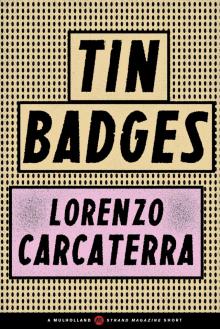 Tin Badges
Tin Badges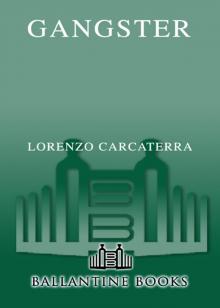 Gangster
Gangster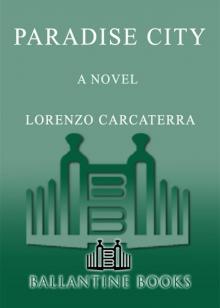 Paradise City
Paradise City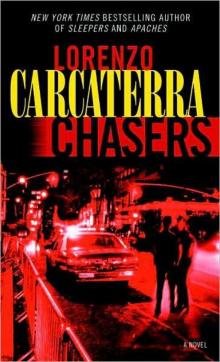 Chasers
Chasers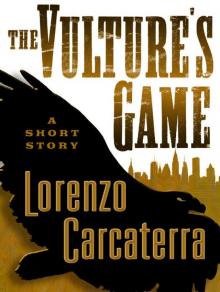 The Vulture's Game
The Vulture's Game Payback
Payback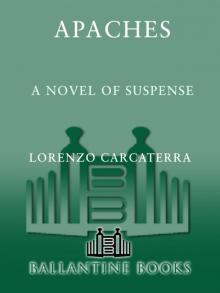 Apaches
Apaches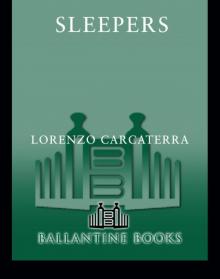 Sleepers
Sleepers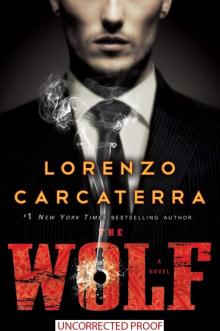 The Wolf
The Wolf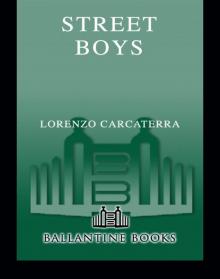 Street Boys
Street Boys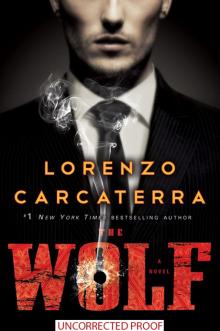 The Wolf: A Novel
The Wolf: A Novel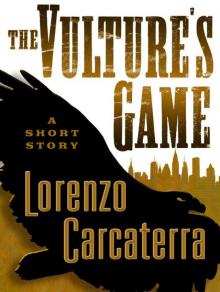 The Vulture's Game (Short Story)
The Vulture's Game (Short Story)